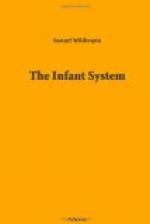As before stated, the gallery had its origin in my desire to teach the children simultaneously. It enables a teacher more readily to secure their full attention in all oral lessons, and establishes a sympathy between them. More real facts may be taught children simultaneously by the master, than can be taught by all the monitors in a school. The little infants should always sit at the bottom, and by no means be confined to another room. They can see and hear all that is going on, and understand it far more than you would suppose, though they cannot yet tell all they learn and know; but when the power of speech comes, they will surprise you with what they have learned. It is therefore a great error to separate children and cut them off from the advantage of all object-lessons, and gallery-teaching, because they are the youngest. They learn more through sympathy and communion with their five or six year elders, than the most clever adult can teach them. An infant-school, is, in many respects, a community in a state of nature. What one does, the other almost involuntarily learns. The merest infants are not an exception to this rule, and therefore the separation in many infant-schools of the children, invariably into two classes, sometimes in two rooms, is a great mistake, and can only arise from ignorance of the laws under which the young mind unfolds itself, and a misunderstanding of the first principles of infant-teaching.
Perhaps one reason that infant-school teaching has not been kept up to its proper point and true standing, is, the desire to make a striking shew before the visitors in a school. I fear the grounds for this opinion are not slight. Perhaps nothing has lead more to the multiplication of singing, even to the injury of the children. The ease with which they learn a metrical piece by rote, and the readiness with which they acquire a tune to it, is surprising, and as the exhibition of such attainments forms a striking sinew, in many cases little else is taught them. But to a sensible and thinking mind, one single piece understood, that is, one where clear ideas are annexed to the words in the minds of the children, is worth a hundred where this is not the case. Intellectual improvement, and moral training, are not thus easily exhibited, especially, the latter; but on dilligent attention to these, the real and permanent utility of the schools depends.




